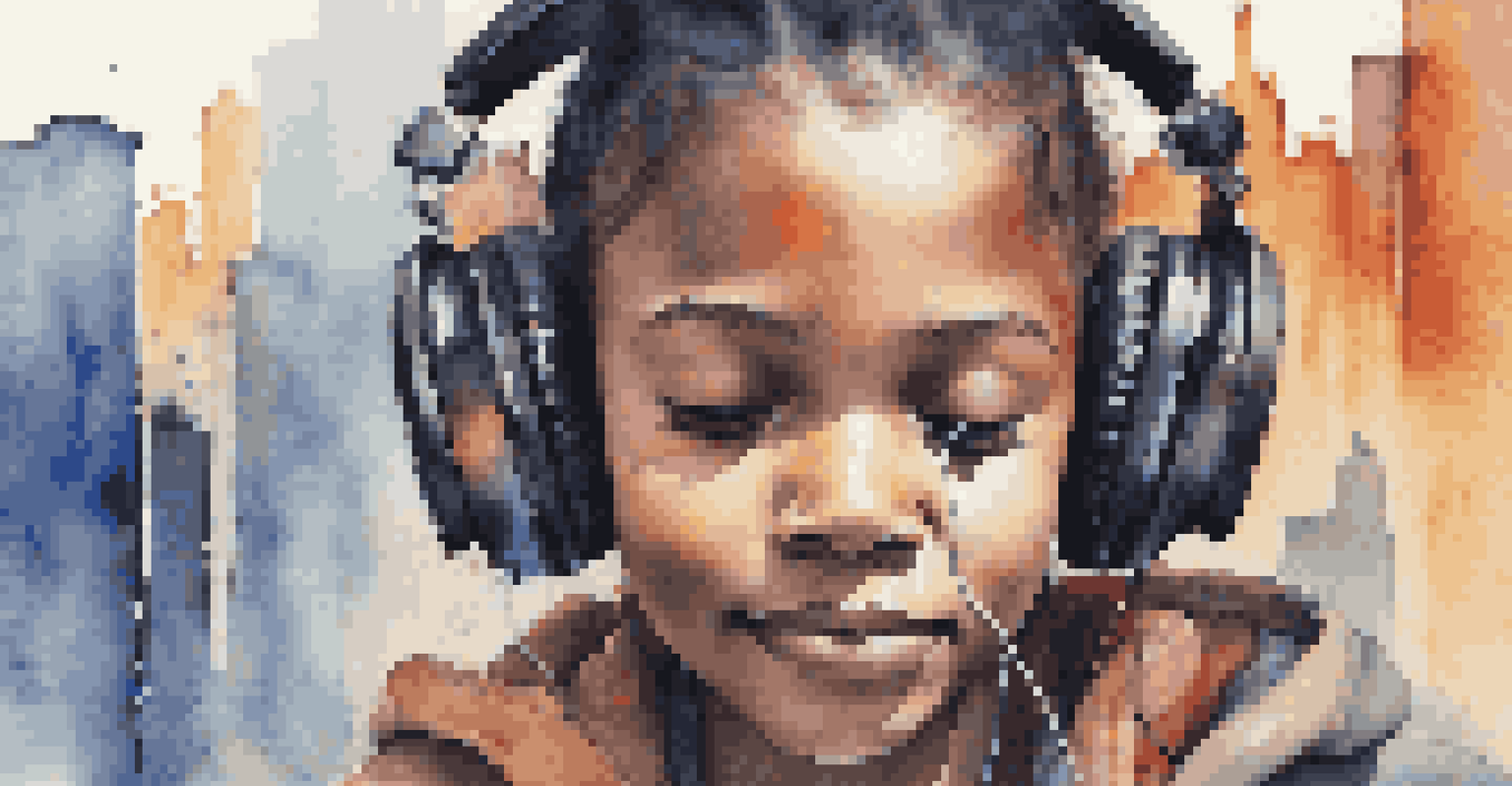The Impact of Music on Youth's Social Connectivity

Music as a Universal Language for Youth
Music transcends cultural and linguistic barriers, making it a universal connector among young people. Whether it's sharing playlists or attending concerts, music creates a platform for youth to bond over shared experiences. This shared passion fosters friendships and enhances social skills, breaking the ice in various social settings.
Music can change the world because it can change people.
For instance, think about how many friendships start over a favorite band or song. These conversations can spark deeper connections, allowing young people to express themselves and discover common interests. In a world where digital communication often overshadows face-to-face interaction, music provides a tangible way to connect.
Moreover, music can evoke emotions that resonate with youth, creating a sense of belonging. When young people listen to songs that reflect their feelings or experiences, they often find solace in knowing they are not alone. This emotional bond can strengthen their social ties as they share these feelings with others.
The Role of Music in Building Community
Music plays a crucial role in forming communities, especially among youth. From local bands to school choirs, music groups allow young people to collaborate and create together. These shared experiences not only enhance their musical skills but also foster a sense of unity and teamwork.

Consider community events like music festivals or open mic nights. These gatherings bring youth together, allowing them to celebrate their talents and appreciate others. Such environments encourage interaction and can lead to lasting friendships that extend beyond the event itself.
Music Connects Youth Across Cultures
Music serves as a universal connector, helping young people bond over shared experiences and emotions.
Additionally, music can act as a catalyst for social change, inspiring youth to engage with their communities. Through songs that address social issues, young people often unite to advocate for causes they are passionate about, further strengthening their social networks.
Digital Music Platforms and Social Connectivity
In today’s digital age, platforms like Spotify and SoundCloud have transformed how youth connect through music. These platforms allow young people to share their playlists and discover new artists, creating virtual communities centered around music. This online interaction can lead to friendships that extend into real life.
Where words fail, music speaks.
Social media also amplifies the impact of music on connectivity. Young people often post about their favorite songs, attend virtual concerts, or participate in challenges related to popular music trends. Such interactions not only enhance their social presence but also provide opportunities for connection with peers who share similar musical tastes.
However, it’s important to balance online and offline interactions. While digital platforms foster connections, nothing beats the experience of live music events. Attending concerts or festivals in person can deepen these connections, allowing friendships to flourish in a shared physical space.
The Power of Music Genres in Social Identity
Music genres often serve as a form of identity for youth, influencing their social circles. For example, a teenager who loves punk rock may find camaraderie with others who share that taste, creating a close-knit group. This sense of belonging can be incredibly powerful during formative years, shaping their social experiences.
Different genres also carry distinct cultural messages, allowing youth to express their individuality. Whether it’s through fashion choices or language, the music they listen to can define how they interact with their peers. This can lead to the development of subcultures, where youth feel empowered to be themselves.
Community Building Through Music
Participating in music groups and events fosters teamwork, unity, and lasting friendships among youth.
However, it’s essential to recognize that music preferences can also lead to exclusivity. Sometimes, strong ties within a particular genre can alienate those who don’t share the same interests. Understanding this dynamic is crucial for fostering inclusivity within youth social groups.
Music as a Tool for Emotional Expression
For many young people, music serves as a vital outlet for emotional expression. Lyrics can capture feelings of joy, sadness, or frustration, allowing youth to process their emotions in a healthy way. Sharing these musical preferences with friends can create deeper conversations and strengthen social bonds.
Imagine a teenager who feels overwhelmed by school pressures finding solace in a song that articulates their struggles. Sharing that song can open up discussions with friends, creating a supportive network where they can express their experiences. This emotional connection can be incredibly comforting during challenging times.
Moreover, participating in music-related activities, like forming a band or joining a chorus, encourages collaboration. These experiences not only help youth express themselves but also teach them the value of teamwork and empathy, essential skills for building strong social relationships.
Live Music Events: A Catalyst for Connection
Live music events are unmatched in their ability to foster social connectivity among youth. Whether it’s a local gig or a large festival, the shared experience of enjoying music together creates lasting memories and friendships. These events often serve as a melting pot for diverse groups, allowing youth from different backgrounds to connect.
At concerts, the energy of the crowd amplifies the sense of community. Young people often find themselves singing along with strangers, creating an instant bond through shared enthusiasm. This collective experience can lead to conversations that spark new friendships, reinforcing the social fabric of their lives.
Live Events Enhance Social Bonds
Live music experiences create memorable connections, encouraging face-to-face interactions and deeper relationships.
Additionally, live music events provide a break from the digital world, encouraging face-to-face interactions. This can be particularly valuable in a time when youth often communicate through screens. Engaging in these shared experiences can lead to deeper connections and a richer social life.
The Future of Music and Youth Connectivity
As technology continues to evolve, so will the ways in which youth connect through music. Innovations like virtual reality concerts and AI-generated playlists may reshape social interactions in the music space. While these advancements can enhance connectivity, they also raise questions about the authenticity of these interactions.
It's important for youth to find balance in their musical experiences, enjoying both digital and live interactions. As they navigate this landscape, they will likely continue to seek genuine connections that enrich their social lives. Music will remain a vital tool for fostering these relationships, regardless of the medium.

Ultimately, the impact of music on youth's social connectivity is profound and evolving. Encouraging young people to explore diverse musical experiences will not only enhance their social skills but also promote a sense of community that transcends individual differences.